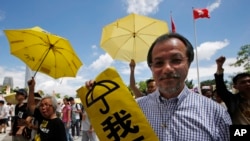This week, Hong Kong's pro-democracy activists turned out in lower numbers than expected for marches marking the 18th anniversary for the territory's handover to China.
After almost a year of non-stop rallies, some 48,000 Hong Kongers took to the street on July 1, making it one of the annual protest’s lowest turnouts since 2003, according to the organizers. Police estimates say the number peaked at 20,000.
That led Johnson Yeung of Civil Human Rights Front into admitting the city’s momentum for democracy has slightly slowed down. And a lack of clear goals and direction for the movement’s future has kept the numbers down, one of the key protest leaders, Joshua Huang of Scholarism, told local media.
But Emily Lau Wai-hing, chairperson of Hong Kong's Democratic Party, downplays the significance of the turnout, said the struggle will go on.
“And now that, the force, the universal [suffrage] package is voted down, there’s a sigh of relief, and of course, people will regroup and continue their struggle,” Lau said.
Hong Kongers haven’t pulled away from their political engagement, she added.
Two weeks earlier, the city’s legislature voted down a China-backed electoral reform proposal by a 28 to 8 vote. The measure would have changed the way the Chinese-controlled territory chooses its next chief executive in 2017, but critics said it did little to alter a system that allows only pro-Beijing candidates.
The rejection was widely viewed as a loss for the city's pro-Beijing political parties.
But Zhang Jian of the Shanghai Institute for International Studies said the vote has led Beijing to put the city’s electoral reform on hold, posing a problem for pro-democracy advocates.
“It's actually not in the interest of the pan-democracy camp after it voted down the political reform proposal because they [pro-democracy activists] will now be excluded in the platform, which used to allow them to further take part in the political arena, and risk losing momentum,” Zhang said.
After veto, what’s next?
Zhang said pro-democracy activists need new issues to keep the public engaged, which will then pressure Beijing into renegotiating the city’s reform agenda.
The democratic movement’s earlier appeal – a popular vote, Leung’s resignation and revisions to the Basic Law, etc. – has turned stale, he said.
But after a year of vocal opposition to Beijing's plans drew widespread international media attention, China is unlikely to offer the activists any chances to engage.
That's because entering again into a dialogue with the pro-democracy groups risks a ripple effect to other parts of the mainland, said Oh Ei Sun, senior fellow of S. Rajaratnam School of International Studies at Nanyang Technological University in Singapore.
“It might inspire people in mainland China to go for [a] greater demand for democracy and so on, if you indeed would have open nominations,” he said. “So, I think that the central government would definitely, for quite some time to come, not [be] in favor of open nominations.”
Hong Kong still a priority
For Beijing, Hong Kong issues will still come before those of Taiwan, Tibet and Xinjiang, as they remain under the control of its authority, said Zhang.
So, the scaled-down rally this week presents an opportunity for Chinese leaders to woo Hong Kong voters by offering more economic benefits, which would trickle down to the city’s middle class instead of merely the wealthy, he said.
Beijing may also look to try to appeal to certain political factions to try to split unified opposition to its policies. That could split Hong Kong's democrats into more moderate and more radical camps.
Upcoming elections in the next year and a half could determine which of those factions is winning more public support.
Another issue that could unite public opinion is the territory's widening wealth gap, said Oh.
“The potential radicalization of the Hong Kong pro-democracy opposition movement would depend to a large extent on the gap between the very rich and the very poor in Hong Kong,” he said. “If indeed we have a widening wealth gap in Hong Kong, then the social economic condition for radicalization would be quite mature.”
Oh, however, believes the city’s next round of heightened political tensions will only arrive in five years in the lead-up to its 2022 chief executive election.




